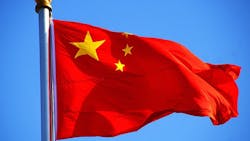US, EU, Japan Fire New Warning Shot Over China Trade Abuse
The U.S., European Union and Japan announced a partnership to tackle overcapacity issues and forced technology transfers, which could inflame their relationship with China.
The three governments issued a joint declaration Tuesday at the World Trade Organization biennial meetings that promised to target the “severe excess capacity in key sectors,” market-distorting subsidies, and policies that force companies to transfer their proprietary technologies abroad.
Though the statement doesn’t specifically mention China, trade officials at the summit in Buenos Aires said the new alliance is designed to be a clear warning shot for Beijing as it seeks to broaden its influence over global trade.
“We, to address this critical concern, agreed to enhance trilateral cooperation in the WTO and in other forums, as appropriate, to eliminate these and other unfair market distorting and protectionist practices by third countries,” according to a joint statement from U.S. Trade Representative Robert Lighthizer, EU Trade Commissioner Cecilia Malmstrom and Japanese Trade Minister Hiroshige Seko.
U.S. trade officials have long criticized what they say is China’s role in overwhelming global steel markets with its excess capacity and driving down prices. The U.S. Commerce Department is due by mid-January to hand a report to President Donald Trump determining whether steel imports, particularly from China, pose a security risk and should be subjected to tariffs.
“Excess capacity is the universal pain point that brings people together,” said Robert Holleyman, a partner at Crowell & Moring LLP in Washington who served as a deputy U.S. trade representative under Barack Obama. “The U.S., EU and Japan want to use every tool they can to get China to address the problem.”
Steel Investigation
The U.S. is also cracking down on steel being routed through third countries from China to avoid duties. This month, the Commerce Department imposed import duties on steel products from Vietnam that came from China.
Though China pledged to reduce the country’s annual steel capacity by as much as 150 million metric tons before 2020, the country remains the world’s largest steel producer and accounts for nearly half of the globe’s total steel production.
In recent years the U.S., EU and Japan have sought to reduce overcapacity in global steel markets via the Group of 20 economies and the Paris-based Organisation for Economic Co-operation and Development. Last month, the office of the U.S. Trade Representative said the OECD effort has failed to produce market-based reforms in countries like China and threatened to “firmly respond to the causes and consequences of steel excess capacity.”
The U.S. has also railed against Chinese policies that force companies such as Amazon.com Inc. and Microsoft Corp. to store their data on servers based in China and surrender their proprietary technologies. The Trump administration is conducting a trade investigation under Section 301 of the Trade Act of 1974 over China’s intellectual practices.
By Bryce Baschuk
About the Author
Bloomberg
Licensed content from Bloomberg, copyright 2016.
